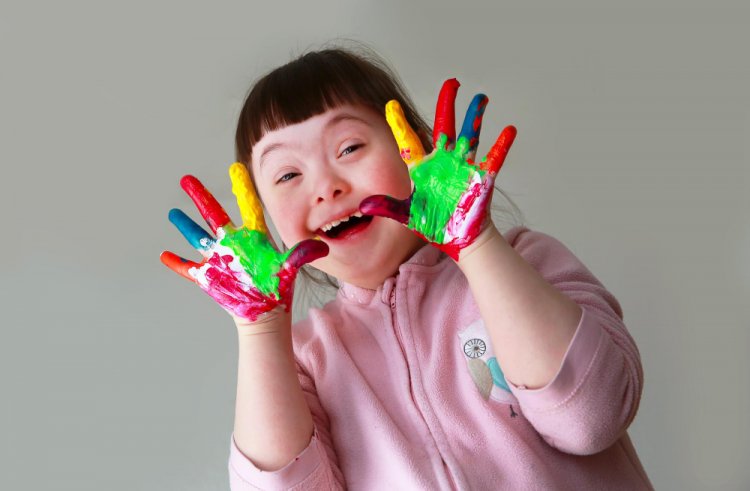Empowering Lives: Strategies for Supporting Down Syndrome Individuals
Down syndrome, also known as trisomy 21, is a genetic disorder caused by the presence of an extra copy of chromosome 21. It is one of the most common genetic disorders and is associated with intellectual disabilities, distinct facial features, and various medical issues. This article provides an in-depth overview of Down syndrome, including its symptoms, causes, prevention, and treatment options.

Symptoms
Individuals with Down syndrome often exhibit a range of physical and developmental symptoms. These may include:
- Intellectual disability: Most individuals with Down syndrome have mild to moderate intellectual disability, although the severity can vary widely.
- Distinct facial features: These features may include almond-shaped eyes, a flat nasal bridge, a protruding tongue, and low muscle tone.
- Delayed developmental milestones: Children with Down syndrome may reach developmental milestones, such as sitting, crawling, and walking, later than their peers.
- Heart defects: Approximately half of babies born with Down syndrome have congenital heart defects, which may require surgical intervention.
- Increased risk of other medical conditions: Individuals with Down syndrome are at a higher risk of developing certain medical issues, such as gastrointestinal problems, respiratory infections, hearing loss, and thyroid disorders.
Causes
Down syndrome is primarily caused by the presence of an extra chromosome 21, resulting from a genetic abnormality. The three main types of Down syndrome are:
- Trisomy 21: This is the most common form of Down syndrome, occurring when each cell in the body has three copies of chromosome 21 instead of the usual two. Trisomy 21 typically occurs sporadically and is not inherited.
- Translocation Down syndrome: In this type, part of chromosome 21 breaks off during cell division and attaches to another chromosome, usually chromosome 14. Translocation Down syndrome can be inherited if one of the parents carries a translocation.
- Mosaicism: Mosaic Down syndrome occurs when some cells have an extra copy of chromosome 21, while others have the typical two copies. Mosaicism typically results from errors in cell division after fertilization and is not inherited.
Prevention
Since Down syndrome is a genetic disorder, it cannot be prevented. However, prenatal screening tests, such as noninvasive prenatal testing (NIPT) and prenatal ultrasound, can detect the presence of Down syndrome during pregnancy. These tests can provide expectant parents with information about their baby's health, allowing them to make informed decisions about their pregnancy and medical care.
Treatment
While there is no cure for Down syndrome, early intervention and medical care can help individuals with the condition lead fulfilling lives. Treatment options may include:
- Early intervention programs: These programs focus on providing therapy and support to address developmental delays and promote learning and socialization skills.
- Educational support: Children with Down syndrome may benefit from special education programs tailored to their individual needs and abilities.
- Medical management: Regular medical check-ups are essential for monitoring and managing any associated health issues, such as heart defects, hearing loss, and thyroid disorders.
- Supportive services: Families of individuals with Down syndrome may benefit from accessing supportive services, such as counseling, support groups, and respite care.
In conclusion, Down syndrome is a genetic disorder characterized by the presence of an extra chromosome 21. While it presents challenges, individuals with Down syndrome can lead happy and fulfilling lives with appropriate support and medical care. Increased awareness, early intervention, and access to supportive services are essential for improving outcomes and quality of life for individuals with Down syndrome and their families.
.
#DownSyndrome #Trisomy21 #GeneticDisorder #IntellectualDisability #DevelopmentalDelays #SpecialEducation #MedicalManagement #SupportiveServices #EmpoweringLives #Awareness #Inclusion #Healthcare #Parenting #Therapy #Education #FamilySupport #CommunitySupport #Acceptance #Diversity #Inclusivity #Empowerment #AbilityNotDisability #LoveAndCare #QualityOfLife
Disclaimer:
The information provided in this article is for educational purposes only and should not be considered medical advice. If you have any health concerns or are experiencing symptoms, it is important to consult with a healthcare professional, such as a doctor or clinic, for proper diagnosis and treatment. Always seek the advice of your doctor or other qualified health provider with any questions you may have regarding a medical condition. Do not disregard professional medical advice or delay in seeking it because of something you have read in this article.
What's Your Reaction?





















